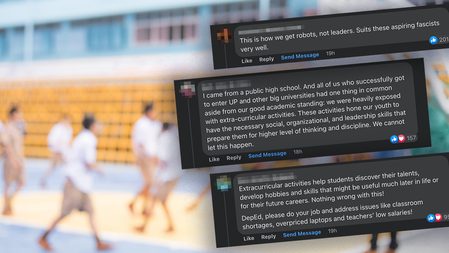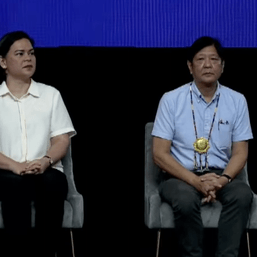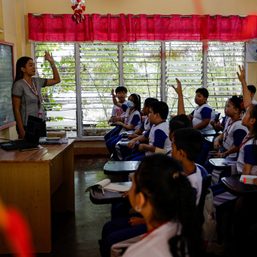SUMMARY
This is AI generated summarization, which may have errors. For context, always refer to the full article.
![[New School] The makings of a battle royal: On DepEd ‘banning’ extracurricular activities](https://www.rappler.com/tachyon/2022/11/extracurricular.jpg)
Scared couldn’t even sum up what I felt when I first watched Kinji Fukasaku’s 2003 masterstroke Battle Royale. Based on the novel of the same name, Royale has one of the most straightforward elevator pitches in cinema: a group of high school students is sent to a secluded island to fight to the death. Think Hunger Games, but bloodier and more depressing. That, and it came out nine years earlier.
It wasn’t only the violence and gore that shocked me but also how clearly it reflected my situation as a high school student. While the plot is centered on an exaggerated dystopia, it doesn’t take much to realize that the movie is an allegory for the competitive educational system. I’ve stayed in the pilot section of my school for the most part, and Royale only scratches the surface of how messy, vicious, and cutthroat getting a good grade is.
In turn, I was also shocked when I read the news that the Department of Education (DepEd) had plans to remove extracurricular activities (excos) this school year. The exact word they used was “ipagbabawal” or “ban,” as per the statement of Vice President and Education Secretary Sara Duterte. While we are only hearing about it now, Duterte seems to be echoing DepEd Order No. 32, series of 22 which was passed last July.
What is ludicrous is that this prohibition serves as one of DepEd’s boldest moves to combat the learning loss of the past two years. As if students, having been stuck at home for two years with nothing else to focus on but unreliable online classes and rain-soaked modules, are not eager to actually have connections outside of their academics.
Plus, why does this move seem like the students are at fault here?
Blaming the system
I will break down how the DepEd defines excos into two parts. The first is as “engagements that are not anchored on the content and performance standards in the curriculum.”
In response to the ban, the Alliance of Concerned Teachers (ACT) pointed out DepEd’s “fixation with achieving the too-cumbersome competency list of the K-12 curriculum.” This also comes at a time when government officials, educators, and the general public have been calling for the K-12 system in the Philippines to be reviewed.
While it was the pandemic that got this uproarious ball rolling, the Philippines was already ranking the lowest out of 79 countries in reading comprehension and below average in mathematics and science back in 2019. Unsurprisingly, conditions did not improve in the two years that followed. Many – and I mean more than 60% of all those asked – admitted that they learned less in the online setup and called for face-to-face classes to resume.
But it isn’t enough to open schools when what is being taught in schools is still faulty.
A 2021 Pulse Asia survey commissioned by Senator Sherwin Gatchalian revealed that 44% of adults are dissatisfied with the K-12 system. This is a 16-point increase from before the pandemic. Gatchalian’s concern is that the K-12 program is not fulfilling its promises, mainly giving graduates adept skills to land jobs. A survey by Philippine Business for Education found that only 20% out of 70 leading companies were comfortable hiring senior high school graduates.
Gatchalian is not proposing that we revert back to the 10-year system, but he wishes that the K-12 program be seriously reviewed to address the glaring cracks.
Former Education Secretary Leonor Briones, in turn, says that the Department of Education is not all to blame for the education crisis. She points out that they were just faithfully following a system that had been in place administrations prior.
If DepEd is not to blame then, in classic battle royal fashion, let’s start pitting people against each other.
Survival of the smartest
The second part of DepEd’s exco definition goes: as “performance standards in the curriculum [that] are offered/coordinated by the school to promote the learner’s holistic development.” This is in line with the main point of ACT’s statement that excos are not just enjoyable after-school activities but also opportunities to learn holistically outside of the academe. They point out: “This [prohibition] can be counterproductive as such can lead to burnout among teachers and students alike.”
I for one am sure this prohibition will lead to burnout.
A study conducted by Steven Craft of the University of Southern Mississippi found that students who involved themselves in excos had higher grade point averages than those who didn’t. Localizing this, the majority of students in Philippine Normal University-North Luzon who are involved in excos said that after-school activities greatly increased their memorization, sharpened their thinking processes, and motivated them to attend school regularly.
For a country where 60% of children strongly agree with the statement “Your intelligence is something about you that you can’t change very much,” extracurricular activities can be vital in helping students realize their untapped potential, especially in things not covered by the curriculum. A student may fail in mathematics, but a literary organization could help them discover that they are a writing prodigy. A student may get low grades in science, but they can still attend afternoon basketball practice for a chance to get that college scholarship.
Extracurriculars should not be seen as the enemy. In fact, they may just be what the child needs to break away from the conventions of the academic institution. They may just prove that a child is still brilliant, still powerful, and still worthy of an education.
Right now, many feel like they aren’t worthy. The Samahan ng Progresibong Kabataan monitored 17 suicide cases directly attributed to distance learning. In the first year of the pandemic, a criminology student died from a motorcycle incident after rushing to find cell signal so she could pass an academic requirement.
After years of students not experiencing social interaction, DepEd wishes to dilute this further by removing alternate opportunities for students to learn. At the very least, extracurricular activities are ways for children to explore new skills and talents. At the very most, they could be what saves our students from placing a numerical value on their worth.
At this point, are we really waiting for the last student standing? – Rappler.com
Aidan Bernales is a Rappler intern. He is a sophomore communications student at the Ateneo de Manila University.
Add a comment
How does this make you feel?



![[The Slingshot] Red zipper on the mouth of Sara Duterte](https://www.rappler.com/tachyon/2024/04/TL-red-zipper-sara-duterte-april-12-2024.jpg?resize=257%2C257&crop=335px%2C0px%2C720px%2C720px)

![[OPINION] How about setting up a heat health warning system in PH schools?](https://www.rappler.com/tachyon/2024/04/heat-health-warning-system-in-PH-schools.jpg?resize=257%2C257&crop_strategy=attention)

There are no comments yet. Add your comment to start the conversation.